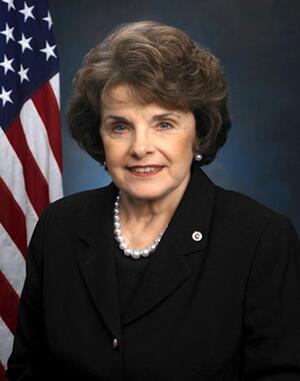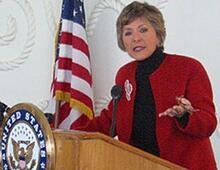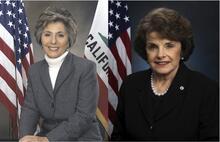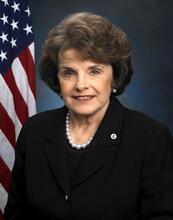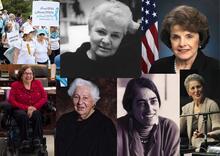Dianne Feinstein
Trailblazing mayor-turned-senator from California, Dianne Feinstein was a long-time member of the U.S. Senate. She was a leading Democrat and a pioneering female senator. Her long and distinguished political career was marked by a series of firsts. In 1984, she was considered by the Democratic Party for nomination for vice president of the United States, in 1990, the Democrats selected her as their first female candidate for California governor, and in 2009 Feinstein became the first woman to chair the Select Committee on Intelligence as well as the first woman to preside over a U.S. presidential inauguration. She and Senator Barbara Boxer were the first women to serve simultaneously as U.S. senators from California, beginning in 1993.
Dianne Feinstein, former mayor of San Francisco, and United States senior senator from California since 1992, was a political pioneer and a long-time U.S. senator. Throughout her career, Feinstein earned a reputation as a leader, reformer, and principal member of the Democratic Party.
Family and Education
The eldest of three daughters, Feinstein was born on June 22, 1933, to Dr. Leon Goldman, a surgeon and professor at the University of California, San Francisco, and Betty (Rosenburg) Goldman. Both of her parents came from Russian immigrant families. The Goldmans were proud of their heritage and could trace their family tree back for generations. Sam Goldman, Dianne’s paternal grandfather, helped found several temples in California, while his son Leon became a prominent donor to San Francisco’s Mount Zion Synagogue. Dianne’s mother’s family, the Rosenburgs, had a more distant relationship with Judaism. Some of them belonged to the Russian Orthodox church.
Growing up, Feinstein was greatly influenced by her paternal uncle, Morris Goldman. In contrast to his Republican-minded brother Leon, Morris was a populist who worked in the city’s garment district and introduced Dianne to the idea of the working class. He took her to San Francisco’s City Hall to watch a meeting of the Board of Supervisors, sparking her interest in politics early on and encouraging her political education. By observing her father and her uncle, Feinstein learned to take a moderated approach to political issues, weighing both sides and considering the complexities of a particular issue or argument.
Feinstein attended a Jewish religious school but later enrolled at the Convent of the Sacred Heart, a prestigious private Catholic high school, in accordance with her mother’s wishes. At that time, she met California Attorney General Edmund (Pat) Brown, the father of a classmate. The teenaged Feinstein impressed Brown with her interest in political life. After Brown was elected governor of California in 1958, he sought out Dianne and gave her a job as an advocate for prison reform.
After graduating from Sacred Heart (the first Jew to do so), Feinstein entered Stanford University, where she excelled academically and became actively involved in politics. In addition to earning a B.S. in History, Feinstein was vice president of her class and joined the Young Democrats. After graduating in 1955, she worked as an intern in public affairs for the Coro Foundation and continued to study public policy.
In 1956, Feinstein eloped with Jack Berman (d. 2002), who served as a San Francisco superior court judge until 1992, but the marriage lasted less than three years. Feinstein and Berman disagreed fundamentally over what they deemed acceptable roles for women. Berman desired that his wife be first and foremost a wife and a mother to their daughter, Katherine (who was nine months old at the time of divorce). Feinstein saw herself in this role but also wanted a professional career in the public sector. In 1962, she married Bertram Feinstein, a distinguished neurosurgeon who was a colleague of her father and twenty years her senior. Their marriage, which lasted until Bertram’s death in 1978, gave Feinstein the freedom to pursue her political career. In 1980, she married Richard Blum, a successful investment banker who also acted in an advisory capacity for Feinstein.
Early Experiences in Politics
Around the time of Feinstein’s divorce from Berman, Governor Edmund S. Brown asked her to join the California Women’s Board of Terms and Paroles. She served from 1960 to 1966, and it was here that she gained her first experiences in criminal reform. In 1968 she served on the San Francisco mayor’s committee on crime and committee on adult detention; a year later, she became the first woman president of the San Francisco Board of Supervisors. Her success and popularity in this capacity won her reelection for two additional terms.
Feinstein was elected to the San Francisco Board of Supervisors in 1969 and became its first woman president for the 1970-1971 year. The 1970s saw San Francisco torn apart by political strife. After the assassinations of Mayor George Moscone and board colleague Harvey Milk in 1978, Feinstein decided to run for mayor. She won the election in 1979 and instituted tough legal and social reforms. Feinstein was admonished by peers for her support of the Carter-Mondale presidential ticket in 1980, when the majority of Bay Area Democrats supported Senator Ted Kennedy’s primary challenge to President Jimmy Carter. In 1983 she was reelected to a second four-year term as mayor. City and State magazine named her America’s Most Effective Mayor in 1987.
Feinstein’s top priority during her nine years as mayor was public safety. She fought crime by increasing the strength of San Francisco’s police department and by cutting down the response time for major emergencies from eight minutes to two. Fiscal responsibility and boosting the local economy were two other important concerns to her. She made sure that the city’s budget was balanced in every year she held office, and she developed relationships with major trading cities in Asia, Europe, and Africa. During her tenure, the famous San Francisco cable car system was rebuilt, city streets were repaved, and the sewer system was upgraded.
Joining the Senate
Feinstein’s long and distinguished political career was marked by a series of firsts. In 1984, she was considered by the Democratic Party for nomination for vice president of the United States. In 1990, the Democrats selected her as their first female candidate for California governor, a bid that was ultimately unsuccessful. When California senator Pete Wilson left that office to become governor of the state in 1992, Feinstein was elected to finish his unexpired term in the Senate. As a freshman senator, she wrote the California Desert Protection Act, which protects some three million acres of national park land.
In 1994, Feinstein was reelected for a full six-year term. As a senator, she continued to be actively engaged in criminal reform, as she was when mayor of San Francisco. She introduced and saw the passage of the Gun-Free Schools Act (1994), requiring public schools to expel for one year any student who brings a gun to school. Both the Coalition to Stop Gun Violence and Handgun Control organizations have recognized her efforts to legislate gun control. Her Hate Crimes Sentencing Enforcement Act (1993) increased the minimum sentences given to those convicted of hate crimes in a federal court. She also introduced the Comprehensive Methamphetamine Control Act, passed in 1996, which limited access to the precursor chemicals needed to make the drug and increased the penalties for smuggling, drug possession, and possession of specialized equipment for making methamphetamine.
Feinstein took an active interest in health and medical issues. Her amendment prohibiting health insurance discrimination on the basis of genetic information is now law, as part of the 1996 Kassebaum-Kennedy health bill. She also worked to pass and increase the funding for the Ryan White AIDS Care Act in 1990 and championed efforts for the funding of HIV/AIDS research, prevention, and treatment. As co-chair of the Senate Cancer Coalition, she presided over hearings that helped to win much-needed funds for cancer research at the National Cancer Institute over the past several decades. Feinstein also consistently voted against efforts to repeal the Affordable Care Act (2010) and played a continuous role in protecting women’s reproductive health decisions.
Feinstein was a member of the now defunct Centrist Coalition, a bipartisan group of 22 moderate senators founded in 1995 whose aim was to bring moderate Democrats and Republicans together. In response to the 1994 earthquake in Northridge, California, Feinstein secured passage of a bill to provide federal disaster relief funds of approximately $11 billion. Her interest in foreign relations gained her positions on various Senate subcommittees overseeing the Middle East, African affairs, and East Asian and Pacific affairs.
Much of Feinstein’s career was devoted to immigration policy, and she was a long-serving member of the Judiciary Subcommittee on Immigration. She was instrumental in the debate and drafting of the Illegal Immigration Reform and Immigration Responsibility Act and helped to block the controversial Gallegly Amendment that would have expelled more than 300,000 children of undocumented immigrants from the public school system. Immigration remained a key issue for Feinstein throughout her career, and she notably posed a fierce challenge to the 2017 Travel Bans barring travelers to the United States from Muslim-majority countries imposed by the Trump administration. Recognizing these bans as discriminatory and motivated by anti-Muslim bias, Feinstein denounced them and introduced legislation aimed at repealing them. President Joseph R. Biden rescinded the so-called Muslim Bans on his first day in office. Feinstein also served on the Senate Rules and Administration Committee.
In 2009, Feinstein became the first woman to chair the Select Committee on Intelligence. She also presided over the historic 2009 inauguration of Barack Obama, as mistress of ceremonies and chair of the United States Congress Joint Committee on Inaugural Ceremonies; she was the first woman to preside over a U.S. presidential inauguration. Feinstein also became the first woman to serve in the role of top Democrat on the Senate Judiciary Committee in 2017. In this role Feinstein oversaw myriad policies as well as major investigations, including the investigation into Russia’s interference in the 2016 presidential election. In the fall of 2020, Feinstein said she would relinquish her role as top Democrat of the committee in the coming year and stated she would seek neither the chairmanship nor a ranking member position in the next Congress. This decision was due in large part to intra-party pressure from progressives who believe she was neither up to the task nor the right fit to represent the Democratic platform because of her historically genteel approach with Republican leadership in what is the increasingly partisan climate of the Judiciary Committee.
Feinstein was reelected to her California senate seat five times. When Barbara Boxer was elected to the Senate in 1993, the two were the first two women to serve any state simultaneously as U.S. Senators; they were also the first two Jewish women in the Senate. In 2012 she received the most popular votes in any United States Senate election in history.
Feinstein played an important role in the conflict surrounding Brett Kavanaugh’s Supreme Court nomination and was scrutinized by many Democrats for her part in his eventual confirmation. Christine Blasey Ford initially revealed allegations of rape against Justice Kavanaugh to Senator Feinstein in a letter in 2018, and Feinstein was accused by other Democrats on the Judiciary Committee of sitting on Blasey Ford’s allegations, causing further tension within the party. Additional concerns arose in 2020 over Feinstein’s alleged mismanagement of Justice Amy Coney Barrett’s Supreme Court confirmation hearing. These missteps gave rise to rumors suggesting cognitive decline and general apprehension over Feinstein’s ability to continue serving in her role and to complete her current term. Feinstein was subject to heightened scrutiny both within and outside the Democratic party, yet she remained a key figure in the Senate and a force within her party.
Honors
In recognition of her public service, Feinstein wasawarded honorary degrees by the University of San Francisco, Mills College, the University of Santa Clara, and Golden Gate University, and various awards, including the American Medical Association’s award for “outstanding contributions” to the betterment of public health. In 1984, French president François Mitterrand bestowed upon her the Légion d’Honneur, one of France’s highest honors. In 2001 she received the Woodrow Wilson Award for public service from the Woodrow Wilson Center of the Smithsonian Institution, and in 2002 she was recognized with the Nathan Davis Award for her service to public health by the American Medical Association.
Feinstein was also recognized with several awards specific to her role and pioneering career as a leading Jewish woman in public office. The American Friends of the Hebrew University of Jerusalem gave her the Scopus Award for outstanding public service in 1981. She received a distinguished public service award from the Los Angeles Anti-Defamation League of B’nai B’rith in 1984, the brotherhood/sisterhood award of the National Conference of Christians and Jews in 1986, and a public service award from the American Jewish Congress in 1987. Also notable is the portrayal of Senator Feinstein by Annette Benning in the 2019 film, The Report, which explored the investigation of the Senate Intelligence Committee into use of torture by the CIA.
Dianne Feinstein died on September 28, 2023.
“American Medical Association Awards for Outstanding Government Service.” American Medical Association. Accessed May 1, 2021. https://www.ama-assn.org/about/awards/american-medical-association-awards-outstanding-government-service.
“Bioguide Search,” Biographical Directory of the United States Congress, accessed May 1, 2021, https://bioguide.congress.gov/search/bio/F000062.
Broder, David S., et al. “Kennedy Ends Fight for Nomination.” Washington Post, August 12, 1980. https://www.washingtonpost.com/archive/politics/1980/08/12/kennedy-ends-fight-for-nomination/93b313cd-2fac-4f9e-a2e8-1d8241e3f9e8/.
Dianne Feinstein. Jewish Virtual Library. Accessed May 3, 2021. https://www.jewishvirtuallibrary.org/dianne-feinstein.
Fandos, Nicholas. “Democrats, Facing Critical Supreme Court Battle, Worry Feinstein Is Not Up to the Task.” New York Times, October 10, 2020. https://www.nytimes.com/2020/10/10/us/politics/dianne-feinstein-supreme-court-judiciary-committee.html.
Fandos, Nicholas. Feinstein, under Fire by Progressives, Says She Will Step down as Top Democrat on the Judiciary Committee.” New York Times, November 23, 2020. https://www.nytimes.com/2020/11/23/us/feinstein-under-fire-by-progressives-says-she-will-step-down-as-top-democrat-on-the-judiciary-committee.html.
Mahtesian, Charles. “Feinstein's Record: 7.3 Million Votes.” Politico, November 26, 2012. https://www.politico.com/blogs/charlie-mahtesian/2012/11/feinsteins-record-73-million-votes-150280.
Mayer, Jane, and Connie Bruck. “Dianne Feinstein's Missteps Raise a Painful Age Question Among Senate Democrats.” The New Yorker, December 9, 2020. Accessed April 28, 2021. https://www.newyorker.com/news/news-desk/dianne-feinsteins-missteps-raise-a-painful-age-question-among-senate-democrats.
Mazzetti, Mark, and Scott Shane. “'The Report' and the Untold Story of a Senate-C.I.A. Conflict.” New York Times, November 15, 2019. https://www.nytimes.com/2019/11/15/movies/the-report-adam-driver.html?searchResultPosition=5.
Mikuski, Barbara, et al. Nine and Counting: The Women of the Senate, New York: Morrow, 2000.
Morris, Celia. Storming the Statehouse: Running for Governor with Ann Richards and Dianne Feinstein. New York: Scribner’s Sons, 1992.
“Proclamation on Ending Discriminatory Bans on Entry to The United States.” The White House, January 21, 2021. https://www.whitehouse.gov/briefing-room/presidential-actions/2021/01/20/proclamation-ending-discriminatory-bans-on-entry-to-the-united-states/.
Roberts, Jerry. Dianne Feinstein: Never Let Them See You Cry. San Francisco, CA: Harper Collins West, 1994.
“Senators Introduce Bill to Repeal Muslim Travel Ban.” Dianne Feinstein United States Senator for California. Accessed May 17, 2021. https://www.feinstein.senate.gov/public/index.cfm/press-releases?id=268781C5-AAA5-45E8-AAFA-9ABAAC761045.
“United States Senator for California.” Dianne Feinstein United States Senator for California. Accessed May 1, 2021. https://www.feinstein.senate.gov/public/.
“U.S. Presidential Inaugurations: Barack Obama.” U.S. Presidential Inaugurations: Barack Obama (Virtual Programs & Services, Library of Congress). Accessed April 29, 2021. https://www.loc.gov/rr/program/bib/inaugurations/obama/index.html.

